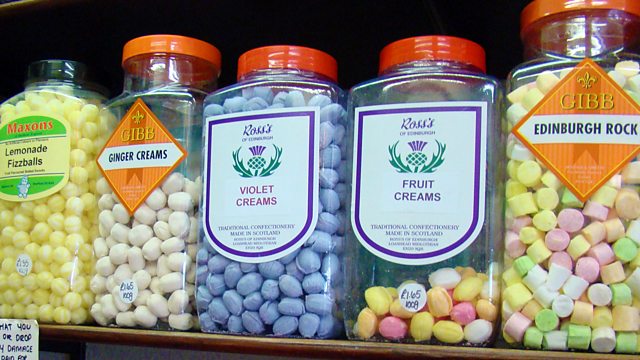Sweet Britain
As the 'sugar debate' rages on, sales of sweets seem stable. Sheila Dillon asks what is still driving British people's love affair with confectionery.
The nutritional debate over sugar doesn't seem to be putting off a new generation of sweet makers in this country. Sweets sales seem stable, and new treats are being created and exported all over the world.
Sheila speaks to sweet makers Freya Sykes and Steven Bletsoe who are giving new life to a forgotten sweet and an old family recipe. She looks at the state of the confectionery market today with help from The Grocer magazine, and Jeremy Dee, Managing Director of family sweets firm Swizzels. And sweets historian Tim Richardson shares a bag of sweets with Sheila that cast light on a long history of sweetness in the UK.
Sheila asks what's still driving our love affair with sweeties - young and old, old and new.
Presented by Sheila Dillon
Produced in Bristol by Clare Salisbury.
Last on
More episodes
Previous
Next
Make Adele Nozedar's humbugs
Humbugs
Somewhere in the North. Probably.
Although the tradition of striped, pulled sugar sweets and their technique
were known, and used, in medieval Arabia, the first humbugs appeared
on British shores in the middle of the nineteenth century.
And while I say humbugs are ‘probably’ from the north of England,
this is based purely on my readings of Elizabeth Gaskell’s Sylvia Lovers,
published in 1863: ‘He had provided himself with a paper of humbugs
for the child – “humbugs” being the North-country term for certain lumps
of toffy, well-flavoured with peppermint.’
As to the origins and etymology of the glorious word ‘humbug’ itself,
there is some debate, although we do know from the Shorter Oxford
Dictionary that it first came into common use between 1730 and 1769.
The most common definition is that a humbug is a ‘hoax’ or a ‘trick’ and
was derived from an Italian phrase, ‘Uomo Bugiardo’, which means,
literally, ‘lying man’. (The Wizard of Oz describes himself as ‘just a
humbug’ and, of course, Charles Dickens’ Ebeneezer Scrooge mutters
‘Bah! Humbug!’ in relation to Christmastime). As well as the more com-
mon humbug – the stripy lump of solid sugar with a mint flavour – I also
discovered a humbug indigenous to Taunton, which startles the happy
sucker when he or she reaches the centre of the sweet. The middle isn’t
sugar at all, but an almond. Perhaps this is the true ‘humbug’, a trick
played on the customer? Whatever the case, we do know that mint oils
and extracts, as well as those of clove and wintergreen, were used as
cold cures in the dark days before cane sugar landed on our shores. The
addition of sugar was a very welcome way of making almost any medi-
cine palatable. Humbugs are an absolute joy to make and a good way
to practise your sugar-pulling and twisting techniques.
450g demerara sugar
150ml water
50g butter
a pinch of cream of tartar
flavouring (mint is traditional)
black food colouring (powdered)
icing sugar, for dusting your hands
��
two 38 x 30cm shallow baking trays, oiled
scissors, the blades dipped in oil
��
Place all the ingredients, except for the flavouring and colour, in a
heavy-bottomed pan and attach your sugar thermometer. Put the pan
over a low heat until the sugar has all dissolved. Bring slowly to the boil
and boil steadily to 143° (soft crack stage) then remove from the heat
immediately. Leave to cool for a few minutes, then pour half the mixture
on to one of the tins and add the colouring and flavouring to the remain-
ing mixture in the pan. Stir well and pour into the second tray.
��
When the mixture can be handled comfortably, find a friend to help you.
Both of you should dust your hands with icing sugar before you each
start to manipulate a tray of toffee, folding and pulling it into long strips
approximately 3cm thick. This should take no more than 10 minutes. If
you don’t have a friend, leave one tray in a warm oven until you’re
ready to give it the same treatment. Twist the two different-coloured strips
together; they will stick to one another. Then pull the entire strip of toffee
until it’s about 2cm wide, and snip into bite-sized lengths with the oiled
scissors. Roll in icing sugar. (The humbugs. Not you.)
Recipe extracted from Great British Sweets: And How To Make Them at ���˿��� by Adele Nozedar, published by Square Peg��
Credits
| Role | Contributor |
|---|---|
| Presenter | Sheila Dillon |
| Producer | Clare Salisbury |
| Interviewed Guest | Freya Sykes |
| Interviewed Guest | Steven Bletsoe |
| Interviewed Guest | Jeremy Dee |
| Interviewed Guest | Tim Richardson |
Broadcasts
- Sun 29 Mar 2015 12:32���˿��� Radio 4 FM
- Mon 30 Mar 2015 15:30���˿��� Radio 4
Featured in...
![]()
Nostalgia
They don't make them like they used to.. .
Download this programme
Subscribe to this programme or download individual episodes.
Can comfort foods really make you feel better?
Yes they can, says Sheila Dillon.
Podcast
-
![]()
The Food Programme
Investigating every aspect of the food we eat



